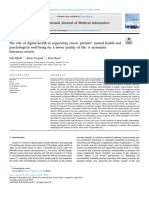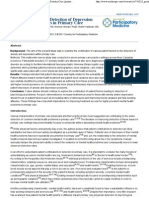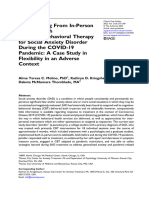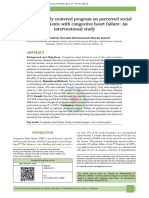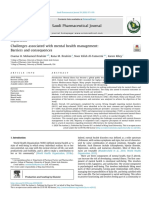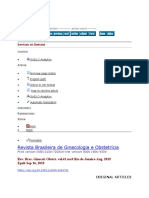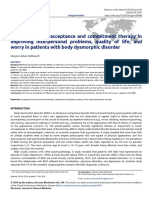Iniii
Iniii
Uploaded by
Tessa Audy JaniarCopyright:
Available Formats
Iniii
Iniii
Uploaded by
Tessa Audy JaniarOriginal Title
Copyright
Available Formats
Share this document
Did you find this document useful?
Is this content inappropriate?
Copyright:
Available Formats
Iniii
Iniii
Uploaded by
Tessa Audy JaniarCopyright:
Available Formats
J Caring Sci, 2023, 12(2), 94-102
doi: 10.34172/jcs.2023.30726
https://jcs.tbzmed.ac.ir TUOMS
PRESS
Review Article
Psychosocial Interventions by Nurses for Patients with HIV/
AIDS: A Systematic Review
ID ID ID
Malihe Davoudi1 , Abbas Heydari2 , Zahra Sadat Manzari2*
Student Research Committee, School of Nursing and Midwifery, Mashhad University of Medical Sciences, Mashhad, Iran
1
Department of Medical-Surgical Nursing, School of Nursing and Midwifery, Mashhad University of Medical Sciences,
2
Mashhad, Iran
Article Info Abstract
Article History: Introduction: Providing psychological support is one of the traditional roles of nurses for
Received: May 11, 2022 patients with HIV/AIDS. Searching the literature showed that various psychological interventions
Accepted: July 5, 2022 have been performed by nurses to support HIV/AIDS patients; however, no summary of these
e-Published: April 26, 2023 interventions is available. We aimed to systematically review the interventional studies which
investigated the effectiveness of psychosocial interventions delivered by nurses to HIV/AIDS
Keywords: patients.
HIV/AIDS, Nurses, Psychology, Methods: This systematic review was performed based on Cochrane’s handbook of systematic
Systematic review reviews of interventional studies. Preferred Reporting Items for Systematic Reviews and Meta-
Analyses (PRISMA) statement were used in this study. The databases of PubMed, Web of
Corresponding Author: Science, Cochrane, Scopus and World Health Organization were searched from January 2009
Zahra Sadat Marzari, to December 2022. Based on inclusion criteria, nine studies included in this systematic review.
Email: ManzariZ@mums.ac.ir Cochrane data extraction form was used for the systematic review and the article’s information
was summarized using the modified Jadad scale.
Results: The interventions provided by the nurses included: virtual and face-to-face educational
programs, written information resources, palliative care, motivational interview, case
management, home visit, and care services, along with face-to-face and telephone follow-up.
These interventions have a significant positive effect on the quality of life and management
of high-risk behaviors, disease management, symptoms and complications, adherence to
treatment, immune function, and mental health in patients with HIV/AIDS.
Conclusion: The results of the present study show that despite the fact that the interventions
have a purely psychological content and can be done with various methods, they are able to
have positive consequences in physical, psychological, behavioral, and laboratory health in
HIV/AIDS patients.
Introduction health disorders such as depression, anxiety, suicide, and
Despite the ongoing attempts to cure and prevent AIDS/ drug abuse.7 So, performing psychological interventions
HIV, this disease remains one of the major health challenges is needed.8
worldwide.1 AIDS/HIV affects all aspects of a person’s Since nurses are more firmly and continuously connected
quality of life, including physical, psychological, social, to the patients, they have the main role in the care of
and spiritual aspects.2 Patients with HIV/AIDS experience patients with AIDS/HIV.9,10 Therefore, their performance
significant medically and psychologically suffering.3 may affect the patients’ treatment and satisfaction.11 One
There is a two-way and complex relationship between of the traditional roles and responsibilities of nurses is to
psychological health and the problems of these patients. provide psychological support. In holistic nursing care,
HIV and associated infections can cause nerve damage.4 psychological support is essential for healing of patients.12
On the other hand, psychological health problems can Psychological support includes any support to help
be caused by antiviral treatment or the social stigma, them improve their psychological, cognitive, emotional,
stress, and economic and social consequences associated and behavioral well-being. Psychological support is
with treatment process.5 Psychological problems can provided by a wide range of professional groups, peers,
negatively affect the adherence to antiviral treatment and informal providers, both in the clinical setting and
and development of AIDS and consequently poorer in the community.13 Psychological support helps patients
health outcomes.6 HIV patients compared to the general make informed decisions, better cope with disease, and
population are more likely to develop psychological better deal with discrimination. Moreover, psychological
© 2023 The Author(s). This work is published by Journal of Caring Sciences as an open access article distributed under the terms of the Creative
Commons Attribution License (http://creativecommons.org/licenses/by-nc/4.0/). Non-commercial uses of the work are permitted, provided the
original work is properly cited.
Psychological interventions for HIV/AIDS
support improves the quality of life of patients with HIV studies.14 The PRISMA statement (Preferred Reporting
and prevents further transmission of HIV infection. Items for Systematic Reviews and Meta-analysis) was used
Besides, this type of support is important for patients in this study.15
with AIDS/HIV to follow antiretroviral therapy and Search strategy was based on PICO (Participants,
ongoing counseling to strengthen adherence to treatment intervention, comparison, and outcomes). The participants
regimens.2 were patients with HIV/AIDS, the intervention was
Searching the literature showed that various psychological interventions, comparisons were routine
psychological interventions have been performed by nurses management (i.e., routine care and standard medical
to support patients with AIDS/HIV, but no summary care) or no intervention, and outcomes were the effects
of these interventions is available. The implications of of the intervention on the physical, psychological, social,
these interventions are also unclear. Therefore, this study and other dimensions of the life of patients with AIDS/
was performed aimed to review and summarize the HIV. Literature searches were performed in the databases
psychological interventions provided by nurses to patients of PubMed, Web of Science, Scopus, Cochrane, and the
with AIDS/HIV. This study increases our knowledge of World Health Organization clinical trials registration
the psychological interventions which nurses can directly system) from 2009 to December 2022. The seminars,
provide to patients with AIDS/HIV. The present study also conferences, congresses, and journals were more searched.
increases nurses’ awareness of the primary and secondary If needed, the researcher contacted the corresponding
consequences of these interventions. Moreover, by author for access to the full text of the article. Keywords
knowing the possible consequences of each intervention, were based on the mesh that included: Psychological
nurses can choose the appropriate intervention according intervention, Mental intervention, Nursing, HIV, AIDS,
to the available options and the patients’ preferences. acquired immune deficiency syndrome, and Human
The novelty and innovative aspects of this study is that, immunodeficiency virus and combination of them using
to the best of our knowledge, this is the first systematic Boolean operators (OR, NOT, AND) (Table 1).
review which summarizes and highlights the outcomes Other citations from the original articles and systematic
of psychological interventions performed by nurses on reviews were also searched and evaluated. After the initial
various aspects of the lives of patients with AIDS/HIV. evaluation, duplicate studies were excluded. Then, the
This study also distinguished the types of psychological abstracts of the articles were reviewed and those which
intervention approaches which are commonly used did not coincide with the inclusion criteria were excluded.
by nurses. Moreover, the results of psychological The full text of the remaining studies was re-evaluated.
interventions were summarized. Our conclusions from Finally, nine studies were analyzed (Table 2).
the collected data provide positive strategies and new The inclusion criteria were: Original articles with
practical evidence for psychological support of patients psychological interventions delivered directly by the
with AIDS/HIV that can be applied in clinical practice. nurse, English articles published in between 2009 and
This review was a comprehensive, detailed, and systematic 2022, randomized clinical trial, experimental or Semi-
search of the literature. This study aimed to systematically experimental study, and access to the full-text file. Also,
review the interventional studies which investigated the the exclusion criteria were: pilot study, articles published
effectiveness of psychosocial interventions delivered by in several sources, articles in the low-quality source, letters
nurses to patients with HIV/AIDS. to the editor, articles without abstract, studies that were
not conducted on patients with HIV/AIDS, and a study in
Material and Methods which psychological interventions were not implemented
This systematic review was performed based on Cochrane’s directly by nurses. In this review, all studies have been
handbook of systematic reviews of interventional conducted based on 4 stages of PRISMA (Figure 1).
Table 1. An example of a database search strategy
Database Search strategy
Search field; title; search term ("psychological intervention" or "mental intervention") AND ("HIV" OR "AIDS" OR "Human immunodeficiency virus"
Web of
OR "acquired immune deficiency syndrome")
science
Limits; restricted to articles, nursing, English, open access
Search: ("psychological intervention"[Title/Abstract] OR "mental intervention"[Title/Abstract]) AND nurse*[Title/Abstract] AND (HIV[Title/Abstract]
PubMed OR AIDS[Title/Abstract] OR "Human immunodeficiency virus"[Title/Abstract] OR "acquired immune deficiency syndrome"[Title/Abstract] ")
Limits: restricted to Randomized Controlled Trial, Controlled Clinical Trial, Clinical Trial, pragmatic Controlled Trial Congress, full text, English
Article title, abstract, keyword; ("psychological intervention" OR "mental intervention") AND (HIV OR "Human immunodeficiency virus") OR ("AIDS
Scopus OR "acquired immune deficiency syndrome")
Limits; nursing, psychology, social science, article, English, open access
Title/abstract, keyword: ("psychological intervention" OR "mental intervention") AND nurse AND ("("HIV" OR "AIDS" OR "Human immunodeficiency
Cochran virus" OR "acquired immune deficiency syndrome")
Limited; trials
Journal of Caring Sciences, 2023, Volume 12, Issue 2 95
Davoudi et al
Table 2. Characteristics of included studies
Type of intervention in the experimental
Total group
Author (year), Type of intervention in the
sample Finding
Country Duration of control group
size Details
intervention
Blank et al16 Providing counseling and
(2011), 238 coordination of home and 12 months Routine care Significant reduction in viral load
USA mental health services
• Moderate to excellent changes in CD4 + T cell
Blank et al17 Home care services and
and viral load
(2014), 238 coordination between 12 months Routine care
• Improving the quality of life in the physical
USA services
and mental dimension
• Improve adherence to treatment
Virtual training and follow-
• Increase self-efficacy
up (motivational skills, 8 weeks In-person counseling
• Reducing stress
Côté et al18 (2015), emotion recognition, and (4 sessions (providing a list of drug-
179 • Increasing positive attitude
Canada management skills, problem of 20-30 related websites and side
• Average increase in the level of social support
solving, and communication minutes) effects)
• Reducing the discomfort associated with the
with others)
symptoms of the disease
• Reducing the number of depression
Symptom management
Eller et al19 (2013), A 30-minute Nutrition and supportive symptoms, severity and its effects
222 training with practical
South Africa session care training • Positive change in the use of self-care and self-
training
management strategies
Hanrahan et al20 An advanced nursing care • Improvement of symptoms of depression,
(2011) model for face-to-face and mental problems
238 12 months Routine care
United States telephone case management • Improving the quality of life related to health
American at home in the physical dimension
• Reducing risky behaviors
Holstad et al21 Training sessions (Nutrition
Motivational group • Increasing the use of protective equipment
(2011), 203 8 sessions and stress control and
interview during sex
USA health complications)
• Better adherence to treatment
• Reduction of pain (in the dimension of ability
to share feelings and feeling valuable in life,
feeling relaxed)
• Reducing psychological complications
Lowther et al22 Palliative care intervention 6 sessions • Reduce worries
(2015), 120 including physical, over 4 Routine care • Enhancing the family's ability to plan for the
Africa emotional and spiritual months future
• Increasing the quality of life in the mental
dimension
• Increasing the quality of life in the physical
dimension
four Enhanced Usual Care
sessions based on the • Reduction of alcohol use disorder recognition
Madhombiro 23
Motivational Interviewing
8 to 10 alcohol treatment module test score
(2020), 235 blended with brief Cognitive
sessions from the World Health • Decreased viral load
Africa Behavioral Therapy
Organization MH GAP • Improving quality of life and performance
intervention guide)
• Decreased pain intensity
Educational intervention • Better pain management
Nkhoma et al24 includes face-to-face • Reducing pain interference with daily life.
(2015), training, pamphlet A 30-minute Pain medication control • Increase patient and family knowledge about
182
Southeastern presentation, instruction session training pain management
Africa booklet, and telephone • Increasing the motivation of the family to
follow-up manage the patient's pain
• Improving the quality of life
Wang et al25 • Increased adherence to treatment
Home visit and telephone
(2010), 116 8 months Routine care • Improved quality of life
contact by a nurse
China • Reduced symptoms of depression
Eight RCT articles, one semi-experimental and one location, interventional measures and study findings.
cluster randomized clinical trial (cRCT) study were found. Initially, several sessions were held to match the rating of
Four interventions were implemented in the patients’ the two evaluators. Before the study, the kappa coefficient
home and five interventions in health care settings. of agreement between the two evaluators was calculated
Cochrane data extraction form was used. The two which was 0.87. In the case of a difference of opinion
authors independently extracted the article information between the two evaluators, the opinion of third evaluator
and agreed upon it after discussion. This form included was used. Two reviewers independently evaluated
the author’s first name, year of publication, research the quality of the articles and analyzed abstracts and
96 Journal of Caring Sciences, 2023, Volume 12, Issue 2
Psychological interventions for HIV/AIDS
Identification
Articles obtained from initial Articles obtained from initial search
search of databases (n = 192) in other sources of information (n=1)
Screenin
g
Records after duplicates removed (n= 176)
Records excluded based on
Eligibility
title and abstracts (n= 132)
Full text studies assessed for eligibility (n = 44)
Full text study excluded (n = 34) with reasons:
No full text of articles = 2
Unknown Intervention provider= 8
Included
Care team as Intervention provider= 3
Studies included in qualitative synthesis (n = 10) The intervention provider is not a nurse = 21
Figure 1. Preferred reporting items systemic review (PRISMA) flowchart
limitations of the studies. Before reviewing the articles, the services, symptom and side effects management services,
names of the authors and journals were eliminated. The palliative care services, case management, and motivational
article information was summarized using the modified interviewing with cognitive behavioral therapy.
JADAD tool. This checklist includes 8 questions assessing The patients were followed-up by phone or in-person.
different sections of the article. A score of 0 to 4 was The duration of Interventions varied from one training
considered as weak study, 4 to 6 as moderate, and scores session to 12 months. The duration of follow-up varied
of ≥ 6 as strong study26 (Table 3). Then, a summary of the from 8 weeks to 24 months. In six studies, the effects of
articles was presented in multidimensional tables. Also, the designed psychological intervention were compared
the mean score and P value were evaluated and compared. with routine care group.16,17,20,22,23,25 in other studies, the
effects of two designed interventions were compared
Results compared.18,19,21,24 The study units in 9 studies were male
Since psychological support for patients with AIDS/ and female patients with AIDS/HIV and in one study only
HIV includes any support provided to help HIV/AIDS women with AIDS/HIV were included. Interventions
patients improve psychological, cognitive, emotional, and were performed on patients with different ages and stages
behavioral well-being, the results of the studies which of the disease and different underlying diseases.23
performed the interventions according to this definition Accordingly, 3 studies reported a decrease in the
are explained in this section. Accordingly, a total of 1975 severity of depression and its symptoms after the
participants started interventions and 1687 included in intervention.19,20,25 Also, 3 studies emphasized the
the analyses at the final follow-up, however, the numbers improvement of patients’ adherence to the treatment
were sometimes unclearly reported. Participants included regimen and the use of antiviral medications after the
adults of any age diagnosed with HIV/AIDS. One study intervention,18,21,25 but in one of these three studies (semi-
involved only women.21 The sample size varied from 11625 experimental study with moderate tool score),18 despite
to 23816,17,20 participants. Women involved 41.77% of the the improvement in adherence to treatment, there was
total population. The mean age of the participants was no significant difference between the intervention and
42/49 years. Also, 40% of these studies were conducted in the control groups. One article suggested that conducting
America, 40% in Africa, 10% in Europe and 10% in Asia. a group motivational interview and a problem-solving
The articles were evaluated by the modified Jadad scale. program led to a reduction in risky behaviors in women
The assessment included the effect of randomization, and increased use of contraceptive methods during sexual
appropriate randomization, blind study, appropriate intercourse.21 Blank et al also found that home-based care
blinding, inclusion and exclusion criteria, adverse programs, counseling on medical and psychological issues
complications, and statistical analysis.26 Of the 10 studies and effective coordination between health care providers
extracted, 1 was a quasi-experimental study, 8 were reduce the viral load and increase the CD4 + T cell count.16,17
randomized clinical trials, and 1 was cluster randomized Concerning the effectiveness of nursing interventions on
clinical trial. Also, 40% (n = 4) had moderate quality and patients’ pain and managing it, some studies showed that
60% (n = 6) had high quality (Table 3). pain intensity can be reduced by receiving palliative care
Nurses’ interventions in the above mentioned studies and face-to-face and phone-based patient education.22,24
included virtual intervention and training of emotional Moreover, the quality of life, especially in the mental and
management skills, communication skills, motivational physical dimensions, significantly increased after the
and problem-solving skills, home care and counseling quantitative and qualitative improvement of the nurse’s
Journal of Caring Sciences, 2023, Volume 12, Issue 2 97
Davoudi et al
interaction with the patient at home.17,20,25A study also
Quality
level
showed that nurses’ use of motivational interviews along
M
H
H
with cognitive behavioral therapy can reduce the alcohol
use disorder recognition test score in patients with AIDS/
points
Total
7.5
7.5
5.5
6.5
5.5
4
6
HIV who consume alcohol even after six months. Also,
this supportive intervention can improve the viral load,
statistical analysis
Reference to the
quality of life and performance of these patients.23
No
0
In addition to the main results, some studies reported
method
secondary outcomes. Accordingly, providing patient
Yes
education (motivational skills, recognizing emotional and
1
*
management skills, problem-solving, and communicating
& unwanted side effects
method of investigating
with others) and virtual follow-up can improve patients’
No 0
Reference to the
*
self-efficacy and reduce perceived stress18,19,22,24; this
intervention increases perceived social support and
reduce the incidence of complications associated with the
Yes
disease. Also, it improves a positive attitude and reduces
1
* anxiety.18 Face-to-face training and providing pamphlets
and educational booklets to the patient and family, as
exclusion criteria
No
inclusion and
well as telephone follow-up make the patient’s pain less
Refer to the
interfering with daily life and increase patient and family
knowledge and motivation for pain management.24 Also,
Yes
1
providing patients with palliative care compared to routine
care makes them less likely to experience psychological
interruptions and
Refers to trial
No
distress, reduces their anxiety, increases family capacity
0
*
crashes
for future planning, and improves their quality of life.22
Theoretical and practical training in the management of
Yes
1
disease symptom makes patients use positive self-care
and self-management strategies to improve their mental
mentioned 0
Blinding (single blind = 0.5
health.19
Not
*
double blind = 1)
Discussion
Given the significant impact of psychological health
No
-1
conditions on physical health, medical care, quality of life,
and risk of HIV transmission, this study was conducted
Yes
0.5
0.5
0.5
0.5
0.5
1
to review and summarize the psychological interventions
performed by nurses on patients with AIDS/HIV. To
investigation
No
0
achieve this goal, eight RCTs, one semi-experimental, and
A blind
one cRCT study were reviewed and evaluated. The results
Yes
1
of this systematic review showed that interventions such
*
as virtual or face-to-face educational programs, written
mentioned 0
information resources, palliative care, motivational
Proper randomization
Not
Table 3. Evaluating and scoring the quality of reviewed articles
interviewing, case management, motivational interviewing
with cognitive-behavioral therapy, and home care
with face-to-face or telephone follow-up can positively
No
-1
affect the quality of life, manage disease and symptoms,
increase patients’ adherence to treatment, improve their
Yes
1
mental and functional health, and reduce patients’ risky
Quality level: H = High; M = Moderate.
being random
No
behaviors. These psychological interventions can be done
Pointing to
by nurses independently because they have the skills to
Yes
deliver them. This is an important point because it is
1
associated with improving patient-related outcomes and
23
achieving health policy goals, and development of nurses’
Madhombiro et al
Hanrahan et al20
24
professional roles.
22
Holstad et al21
Nkhoma et al
Lowther et al
Wang et al25
Blank et al16
Blank et al17
18
19
Since this study is the first study to answer the research
Côté et al
Eller et al
Author
question “what are nursing psychological interventions in
patients with AIDS/HIV and what are the consequences?”,
98 Journal of Caring Sciences, 2023, Volume 12, Issue 2
Psychological interventions for HIV/AIDS
therefore, the findings of other similar studies were used interventions along with medical treatments play an
to compare the results: important role for patients to manage pain.36 The benefits
The results of the Borgmann and Schmidt showed that of using psychological approaches include increasing pain
psychological interventions improved the quality of life self-control, improving pain management, reducing pain-
of men with prostate cancer. They found that the patients related disability, and reducing emotional stress through
who participated in psychological interventions had a self-monitoring, and behavioral and cognitive therapy.
higher quality of life at the end of the interventions. This Implementing these interventions can help patients more
improvement was significant in the physical dimension, control pain. Also, the skills trained through psychological
but there was no evidence to support the significant effect interventions enable patients to actively manage their
of the interventions in the psychological dimension.27 disease and provide valuable skills that patients can apply in
Anderson and Ozakinci in a review study examined the their life.37 However, Ziehm et al in their systematic review
impact of psychological interventions on the quality of stated that psychological interventions didn’t decrease the
life of patients with chronic conditions; they reported the pain of patients undergoing open-heart surgery.38
significant effect of such interventions on the quality of Psychological interventions can also affect different
life.28 However, the results of a systematic review study by aspects of psychological health in patients with AIDS/HIV.
Timmer et al contradict the present study. They evaluated In addition to physical problems such as pain and lack of
the impact of psychological interventions on patients energy, psychological health problems such as depression
with inflammatory bowel disease, and reported that of and anxiety are also common among patients with AIDS/
the 21 clinical trials reviewed, there was no evidence to HIV.39 The prevalence of mood disorders or depressive
support the effectiveness of psychiatric interventions on symptoms is approximately 33% and the prevalence of
quality of life in adult patients.29 In the study of MacKenzie anxiety is about 20%.40 Thus, psychological interventions
et al there was no evidence to support the effectiveness appear to be associated with improved depression,
of psychological interventions on the quality of life of anxiety, and distress. Consistent with this finding, a
patients undergoing strabismus surgery.30 review study showed that psychological interventions
In the present study, the impact of psychological leads to a short, mid, and long-term reduction in the
interventions on high-risk behaviors of patients with severity of depression in diabetic patients.41 Ziehm et
AIDS/HIV was reported in a moderate-quality study. Risky al also reported that psychological interventions can
sexual behaviors appear to be related to the psychological reduce the psychological stress experienced in patients
health of patients with AIDS/HIV. One study found that undergoing open-heart surgery.38 In contrast to the
women with negative emotions were not able to cope findings of the present study, the results of a systematic
with stress due to the desire to use condoms in sexual review did not confirm the effectiveness of psychological
intercourse. There was also a significant relationship interventions on the improvement of psychological health
between hopelessness and loneliness and sexual risk in of patients with sickle cell anemia.42 Also, Natale et al
homosexual men.31 Another study which examined the .didn’t confirm the impact of psychological interventions
relationship between depression and condom use among on major depression in hemodialysis patients.43 Fisher
278 Chinese women found that 62% of participants had et al also found no significant difference between the
severe depression and were less likely to use condoms psychological intervention group and the usual care group
consistently.32 These results emphasize that psychological in anxiety and depression among children with chronic
interventions may reduce the risk of sexual behaviors and recurrent pain.44
and thus decrease HIV transmission. Meader et al also The efficacy of psychological interventions on
reported that women with drug abuse change their high- laboratory markers of patients with AIDS/HIV was also
risk behaviors, such as sexual and injective behaviors, if seen in two studies. They reported that providing medical
they receive psychological interventions. However, there and home care services to patients results in reduced
was no significant difference between women receiving viral load and improved CD4 + T cell. Since psychological
psychological intervention and those receiving routine factors (such as depressive symptoms and stress) affect
care.33 Carvalho et al also reported the limited effect of immune function such as decreasing CD4 + T cell
behavioral interventions on condom use in women with and increasing viral load,45 therefore, psychological
HIV.34 However, given that only one study examined high- interventions with a positive impact on depression and
risk behaviors in women, no definite conclusions can be anxiety in these patients may be influenced by laboratory
made on the impact of psychological interventions to results and immune function. Also, since psychological
increase protected sex behaviors among patients. interventions lead to increased adherence to treatment,
Kisely et al in a study with moderate quality found improvements in laboratory markers can be considered
that psychological intervention, especially those with the one of the therapeutic consequences of adherence. Locher
cognitive-behavioral approach, will be effective on heart et al also agree with the present findings regarding the
pain in people without coronary artery disease.35 Another impact of psychological interventions on viral load and
study with good quality reported that psychological adherence to treatment.46 Moreover, Chew et al also found
Journal of Caring Sciences, 2023, Volume 12, Issue 2 99
Davoudi et al
that psychological interventions compared to routine Research Highlights
care may lead to improved HbA1C outcomes in diabetic
patients. Since the reviewed articles have low-quality What is the current knowledge?
levels, they emphasized that stronger evidence is needed • HIV/AIDS patients experience significant
to confirm the impact of psychological interventions on medically and psychologically suffering
HbA1C levels.47 Madhombiro et al also reported similar • One of the traditional responsibilities and roles of
results between the groups receiving the psychological nurses is psychological support for these patients.
intervention and routine care in terms of viral load and • We do not know what interventions nurses
CD4 + T cell. Their finding contradicts the results of the can take directly and independently to provide
present study.48 psychological support to these patients and what
According to the results of the present study, are the consequences.
psychological interventions also increase adherence to What is new here?
treatment. Adherence to treatment in patients with AIDS/ • Virtual and face-to-face training programs, written
HIV is important because it improves health and well-being information resources, palliative care, motivational
and reduces the risk of infection transmission. Failure interviewing, case management, visits and home
adherence to treatment is associated with psychological care services along with face-to-face and telephone
health problems and stressors, such as depression49 and follow-up can be done directly by nurses.
anxiety.50 The results of a meta-analysis study showed • Psychological interventions have a significant
that psychological factors are strongly associated with positive effect on quality of life and management
adherence to treatment.51 People with psychological of high-risk behaviors, disease management,
health problems due to cognitive and behavioral problems and adherence to treatment, immune system
such as fatigue, hopelessness, decreased motivation function and psychological health in patients with
and concentration may have more difficulty in seeking HIV/AIDS.
treatment.52 Psychological interventions primarily focus
on psychological or social factors rather than just on
medical factors. Therefore, psychological therapies may lead to the achievement of health goals in the physical,
be a priority for adherence to treatment. Goldbeck et psychological, behavioral and laboratory fields. However,
al also emphasize the positive effect of psychological the clinical impact of these results is unclear because this
interventions on diet in children with cystic fibrosis.53 systematic review only summarized and reported results
These differences in different studies can be attributed qualitatively. Therefore, it is not possible to measure
to differences in the power and quality of studies, and the intensity of the interventions from this systematic
intervention protocols (provider, skill level, content, style, review. So, it is suggested to conduct meta-analysis studies
duration of intervention, etc.), and target groups. to determine the intensity of the effect of each of these
One of the strengths of this study is that it was conducted interventions on specific aspects of the problems of
comprehensively because several databases and reviewed patients with AIDS/HIV.
articles published from 2009 to 2022 were searched. Also,
to the best of our knowledge, this systematic review is Acknowledgments
The authors would like to thank all the authors of the articles used
one of the first records to document the psychological in this review study. Also, the central library authorities of Mashhad
interventions directly provided by nurses to patients with University of Medical Sciences is appreciated for providing access
AIDS/HIV. So it can be a guideline for future research. to related studies from various databases.
Limitations of this review study include lack of access
to full-text articles despite contact with authors and lack Authors’ Contribution
Conceptualization: Malihe Davoudi, Abbas Heydari, Zahra Sadat
of knowledge of authors in non-English languages. The
Manzari.
results of this study may also be influenced by the bias Data curation: Malihe Davoudi.
in the studies and a considerable degree of heterogeneity Formal analysis: Malihe Davoudi, Zahra Sadat Manzari.
between them. In general, given the limited literature Funding acquisition: Abbas Heydari.
in this area, it is needed for further clinical trials on Methodology: Malihe Davoudi, Abbas Heydari, Zahra Sadat
Manzari.
the research question. Meta-analysis studies are also
Project administration: Abbas Heydari.
recommended to gain a clear understanding of the results. Supervision: Abbas Heydari, Zahra Sadat Manzari.
Writing–original draft: Malihe Davoudi.
Conclusions Writing–review & editing: Abbas Heydari, Zahra Sadat Manzari.
There is evidence that nurses are able to independently
Competing Interests
design and implement effective psychological interventions
There is no conflict of interest.
for patients with AIDS/HIV. This is a fundamental step for
developing the professional roles of nurses and improving Data Availability
the care of AIDS/HIV patients. These interventions All data generated or analyzed during this study are included in this
100 Journal of Caring Sciences, 2023, Volume 12, Issue 2
Psychological interventions for HIV/AIDS
published article. et al. Updated guidance for trusted systematic reviews: a new
edition of the Cochrane Handbook for Systematic Reviews
Ethical Approval of Interventions. Cochrane Database Syst Rev. 2019; 10:
Ethical considerations have been observed in all stages of research, ED000142. doi: 10.1002/14651858.ed000142
including the study and collection of data, their documentation, 15. Moher D, Liberati A, Tetzlaff J, Altman DG. Preferred reporting
analysis, and publication. items for systematic reviews and meta-analyses: the PRISMA
statement. PLoS Med. 2009; 6(7): e1000097. doi: 10.1371/
Funding journal.pmed.1000097
The financial support of this study was provided by the Research 16. Blank MB, Hanrahan NP, Fishbein M, Wu ES, Tennille JA, Ten
and Technology Vice-Chancellor of Mashhad University of Medical Have TR, et al. A randomized trial of a nursing intervention for
Sciences. HIV disease management among persons with serious mental
illness. Psychiatr Serv. 2011; 62(11): 1318-24. doi: 10.1176/
References ps.62.11.pss6211_1318
1. World Health Organization (WHO). Global HIV & AIDS 17. Blank MB, Hennessy M, Eisenberg MM. Increasing quality of
Statistics—Fact Sheet. 2019. Available from: https://www. life and reducing HIV burden: the PATH + intervention. AIDS
unaids.org/en/resources/fact-sheet. Behav. 2014; 18(4): 716-25. doi: 10.1007/s10461-013-0606-x
2. Paul AA, Premraj FC. Psychosocial problems and its impact 18. Côté J, Godin G, Ramirez-Garcia P, Rouleau G, Bourbonnais
faced by the HIV/AIDS infected patients. IOSR J Humanit Soc A, Guéhéneuc YG, et al. Virtual intervention to support self-
Sci. 2008; Available from: https://www.iosrjournals.org/iosr- management of antiretroviral therapy among people living
jhss/papers/Conf.17004/Volume-3/7.%2040-45.pdf. with HIV. J Med Internet Res. 2015;17(1):e6. doi: 10.2196/
3. Pahuja M, Merlin J, Selwyn PA, Sullivan M. Issues in HIV/ jmir.3264
AIDS in Adults in Palliative Care. 2021. Available from: https:// 19. Eller LS, Kirksey KM, Nicholas PK, Corless IB, Holzemer
www.uptodate.com/contents/issues-in-hiv-aids-in-adults- WL, Wantland DJ, et al. A randomized controlled trial
in-palliative-care#:~:text = Associated%20conditions%20 of an HIV/AIDS Symptom Management Manual for
%E2%80%93%20Co%2Doccurring%20pain,and%20 depressive symptoms. AIDS Care. 2013; 25(4): 391-9. doi:
substance%20use%20%5B71%2C111%2C112%5D. 10.1080/09540121.2012.712662
4. Owe-Larsson B, Säll L, Salamon E, Allgulander C. HIV 20. Hanrahan NP, Wu E, Kelly D, Aiken LH, Blank MB.
infection and psychiatric illness. Afr J Psychiatry (Johannesbg). Randomized Clinical trial of the effectiveness of a home-based
2009; 12(2): 115-28. doi: 10.4314/ajpsy.v12i2.43729 advanced practice psychiatric nurse intervention: outcomes
5. Yi S, Chhoun P, Suong S, Thin K, Brody C, Tuot S. AIDS-related for individuals with serious mental illness and HIV. Nurs Res
stigma and mental disorders among people living with HIV: Pract. 2011; 2011: 840248. doi: 10.1155/2011/840248
a cross-sectional study in Cambodia. PLoS One. 2015; 10(3): 21. Holstad MM, DiIorio C, Kelley ME, Resnicow K, Sharma S.
e0121461. doi: 10.1371/journal.pone.0121461 Group motivational interviewing to promote adherence to
6. Buckingham E, Schrage E, Cournos F. Why the Treatment of antiretroviral medications and risk reduction behaviors in
mental disorders is an important component of HIV prevention HIV infected women. AIDS Behav. 2011; 15(5): 885-96. doi:
among people who inject drugs. Adv Prev Med. 2013; 2013: 10.1007/s10461-010-9865-y
690386. doi: 10.1155/2013/690386 22. Lowther K, Selman L, Simms V, Gikaara N, Ahmed A, Ali Z,
7. Hughes E, Bassi S, Gilbody S, Bland M, Martin F. Prevalence et al. Nurse-led palliative care for HIV-positive patients taking
of HIV, hepatitis B, and hepatitis C in people with severe antiretroviral therapy in Kenya: a randomised controlled
mental illness: a systematic review and meta-analysis. trial. Lancet HIV. 2015; 2(8): e328-34. doi: 10.1016/s2352-
Lancet Psychiatry. 2016; 3(1): 40-8. doi: 10.1016/s2215- 3018(15)00111-3
0366(15)00357-0 23. Madhombiro M, Kidd M, Dube B, et al. Effectiveness of a
8. Chuah FLH, Haldane VE, Cervero-Liceras F, Ong SE, Sigfrid LA, psychological intervention delivered by general nurses for
Murphy G, et al. Interventions and approaches to integrating alcohol use disorders in people living with HIV in Zimbabwe:
HIV and mental health services: a systematic review. Health a cluster randomized controlled trial. J Int AIDS Soc.
Policy Plan. 2017; 32(Suppl 4): iv27-iv47. doi: 10.1093/ 2020;23(12):e25641. doi:10.1002/jia2.25641
heapol/czw169 24. Nkhoma K, Seymour J, Arthur A. An educational intervention to
9. Dumitru G, Irwin K, Tailor A. Updated federal recommendations reduce pain and improve pain management for malawian people
for HIV prevention with adults and adolescents with HIV in The living with HIV/AIDS and their family carers: a randomized
United States: the pivotal role of nurses. J Assoc Nurses AIDS controlled trial. J Pain Symptom Manage. 2015;50(1):80-90.
Care. 2017; 28(1): 8-18. doi: 10.1016/j.jana.2016.09.011 e4. doi: 10.1016/j.jpainsymman.2015.01.011
10. Tunnicliff SA, Piercy H, Bowman CA, Hughes C, Goyder EC. 25. Wang H, Zhou J, Huang L, Li X, Fennie KP, Williams AB. Effects
The contribution of the HIV specialist nurse to HIV care: a of nurse-delivered home visits combined with telephone calls
scoping review. J Clin Nurs. 2013; 22(23-24): 3349-60. doi: on medication adherence and quality of life in HIV-infected
10.1111/jocn.12369 heroin users in Hunan of China. J Clin Nurs. 2010; 19(3-4):
11. Wood JH, Chambers M, White SJ. Nurses’ knowledge of and 380-8. doi: 10.1111/j.1365-2702.2009.03048.x
attitude to electroconvulsive therapy. J ect. 2007; 23(4): 251-4. 26. Lempesi E, Koletsi D, Fleming PS, Pandis N. The reporting
doi: 10.1097/yct.0b013e31813e0692 quality of randomized controlled trials in orthodontics. J
12. Papathanassoglou ED. Psychological support and outcomes Evid Based Dent Pract. 2014; 14(2): 46-52. doi: 10.1016/j.
for ICU patients. Nurs Crit Care. 2010; 15(3): 118-28. doi: jebdp.2013.12.001
10.1111/j.1478-5153.2009.00383.x 27. Borgmann H, Schmidt S. [Psychosocial interventions for men
13. The Australasian Society for HIV, Viral Hepatitis and Sexual with prostate cancer]. Urologe A. 2015; 54(6): 863-6. doi:
Health Medicine (ASHM). Standards for Psychological Support 10.1007/s00120-015-3858-4
for Adults with HIV. 2010. Available from: https://www.bhiva. 28. Anderson N, Ozakinci G. Effectiveness of psychological
org/file/BbShtfyMFNKCz/Standards_for_psychological_ interventions to improve quality of life in people with long-
support_for_adults_living_with_HIV.pdf. term conditions: rapid systematic review of randomised
14. Cumpston M, Li T, Page MJ, Chandler J, Welch VA, Higgins JP, controlled trials. BMC Psychol. 2018; 6(1): 11. doi: 10.1186/
Journal of Caring Sciences, 2023, Volume 12, Issue 2 101
Davoudi et al
s40359-018-0225-4 Br J Haematol. 2005; 129(6): 723-9. doi: 10.1111/j.1365-
29. Timmer A, Preiss JC, Motschall E, Rücker G, Jantschek G, Moser 2141.2005.05500.x
G. Psychological interventions for treatment of inflammatory 43. Natale P, Palmer SC, Ruospo M, Saglimbene VM, Rabindranath
bowel disease. Cochrane Database Syst Rev. 2011; (2): KS, Strippoli GF. Psychosocial interventions for preventing and
CD006913. doi: 10.1002/14651858.CD006913.pub2 treating depression in dialysis patients. Cochrane Database
30. MacKenzie K, Hancox J, McBain H, Ezra DG, Adams G, Syst Rev. 2019; 12(12): CD004542. doi: 10.1002/14651858.
Newman S. Psychosocial interventions for improving quality CD004542.pub3
of life outcomes in adults undergoing strabismus surgery. 44. Fisher E, Law E, Dudeney J, Palermo TM, Stewart G, Eccleston
Cochrane Database Syst Rev. 2016; 2016(5): CD010092. doi: C. Psychological therapies for the management of chronic and
10.1002/14651858.CD010092.pub4 recurrent pain in children and adolescents. Cochrane Database
31. Su X, Zhou AN, Li J, Shi LE, Huan X, Yan H, et al. Depression, Syst Rev. 2018; 9(9): CD003968. doi: 10.1002/14651858.
loneliness, and sexual risk-taking among HIV-negative/ CD003968.pub5
unknown men who have sex with men in China. Arch Sex Behav. 45. Ironson G, O’Cleirigh C, Fletcher MA, Laurenceau JP, Balbin E,
2018; 47(7): 1959-68. doi: 10.1007/s10508-017-1061-y Klimas N, et al. Psychosocial factors predict CD4 and viral load
32. Hong Y, Li X, Fang X, Zhao R. Depressive symptoms and change in men and women with human immunodeficiency
condom use with clients among female sex workers in China. virus in the era of highly active antiretroviral treatment.
Sex Health. 2007; 4(2): 99-104. doi: 10.1071/sh06063 Psychosom Med. 2005; 67(6): 1013-21. doi: 10.1097/01.
33. Meader N, Li R, Des Jarlais DC, Pilling S. Psychosocial psy.0000188569.58998.c8
interventions for reducing injection and sexual risk behaviour 46. Locher C, Messerli M, Gaab J, Gerger H. Long-term effects
for preventing HIV in drug users. Cochrane Database Syst of psychological interventions to improve adherence to
Rev. 2010; 2010(1): CD007192. doi: 10.1002/14651858. antiretroviral treatment in HIV-infected persons: a systematic
CD007192.pub2 review and meta-analysis. AIDS Patient Care STDS. 2019;
34. Carvalho FT, Gonçalves TR, Faria ER, Shoveller JA, Piccinini CA, 33(3): 131-44. doi: 10.1089/apc.2018.0164
Ramos MC, et al. Behavioral interventions to promote condom 47. Chew BH, Vos RC, Metzendorf MI, Scholten RJ, Rutten GE.
use among women living with HIV. Cochrane Database Psychological interventions for diabetes-related distress in
Syst Rev. 2011; (9): CD007844. doi: 10.1002/14651858. adults with type 2 diabetes mellitus. Cochrane Database
CD007844.pub2 Syst Rev. 2017; 9(9): CD011469. doi: 10.1002/14651858.
35. Kisely SR, Campbell LA, Skerritt P, Yelland MJ. Psychological CD011469.pub2
interventions for symptomatic management of non-specific 48. Madhombiro M, Musekiwa A, January J, Chingono A, Abas M,
chest pain in patients with normal coronary anatomy. Seedat S. Psychological interventions for alcohol use disorders
Cochrane Database Syst Rev. 2010; (1): CD004101. doi: in people living with HIV/AIDS: a systematic review. Syst Rev.
10.1002/14651858.CD004101.pub3 2019; 8(1): 244. doi: 10.1186/s13643-019-1176-4
36. Jensen MP. Psychosocial approaches to pain management: an 49. Gonzalez JS, Batchelder AW, Psaros C, Safren SA. Depression
organizational framework. Pain. 2011; 152(4): 717-25. doi: and HIV/AIDS treatment nonadherence: a review and meta-
10.1016/j.pain.2010.09.002 analysis. J Acquir Immune Defic Syndr. 2011; 58(2): 181-7.
37. Roditi D, Robinson ME. The role of psychological interventions doi: 10.1097/QAI.0b013e31822d490a
in the management of patients with chronic pain. Psychol Res 50. Safren SA, O’Cleirigh C, Tan JY, Raminani SR, Reilly LC,
Behav Manag. 2011; 4: 41-9. doi: 10.2147/prbm.s15375 Otto MW, et al. A randomized controlled trial of cognitive
38. Ziehm S, Rosendahl J, Barth J, Strauss BM, Mehnert A, Koranyi behavioral therapy for adherence and depression (CBT-AD) in
S. Psychological interventions for acute pain after open heart HIV-infected individuals. Health Psychol. 2009; 28(1): 1-10.
surgery. Cochrane Database Syst Rev. 2017; 7(7): CD009984. doi: 10.1037/a0012715
doi: 10.1002/14651858.CD009984.pub3 51. Langebeek N, Gisolf EH, Reiss P, Vervoort SC, Hafsteinsdóttir
39. Morrison MF, Petitto JM, Ten Have T, Gettes DR, Chiappini MS, TB, Richter C, et al. Predictors and correlates of adherence
Weber AL, et al. Depressive and anxiety disorders in women to combination antiretroviral therapy (ART) for chronic HIV
with HIV infection. Am J Psychiatry. 2002; 159(5): 789-96. infection: a meta-analysis. BMC Med. 2014; 12: 142. doi:
doi: 10.1176/appi.ajp.159.5.789 10.1186/preaccept-1453408941291432
40. Evans DL, Charney DS, Lewis L, Golden RN, Gorman JM, 52. Wagner GJ, Goggin K, Remien RH, Rosen MI, Simoni J,
Krishnan KR, et al. Mood disorders in the medically ill: Bangsberg DR, et al. A closer look at depression and its
scientific review and recommendations. Biol Psychiatry. 2005; relationship to HIV antiretroviral adherence. Ann Behav Med.
58(3): 175-89. doi: 10.1016/j.biopsych.2005.05.001 2011; 42(3): 352-60. doi: 10.1007/s12160-011-9295-8
41. Baumeister H, Hutter N, Bengel J. Psychological and 53. Goldbeck L, Fidika A, Herle M, Quittner AL. Psychological
pharmacological interventions for depression in patients with interventions for individuals with cystic fibrosis and their
diabetes mellitus: an abridged Cochrane review. Diabet Med. families. Cochrane Database Syst Rev. 2014; 2014(6):
2014; 31(7): 773-86. doi: 10.1111/dme.12452 CD003148. doi: 10.1002/14651858.CD003148.pub3
42. Anie KA. Psychological complications in sickle cell disease.
102 Journal of Caring Sciences, 2023, Volume 12, Issue 2
You might also like
- Section E: Service Manual - JS200, JS140 & JS205Document195 pagesSection E: Service Manual - JS200, JS140 & JS205Ko Zay89% (9)
- e18749445304007Document7 pagese18749445304007Sabrina NMNo ratings yet
- Assessment of Stigmatizing Attitude Towards Depression and Its Treatment Among Medical and Paramedical Students An ExploDocument6 pagesAssessment of Stigmatizing Attitude Towards Depression and Its Treatment Among Medical and Paramedical Students An ExploadwitiyaNo ratings yet
- Misurya 2020 AC RevisãoSistemáticaDocument17 pagesMisurya 2020 AC RevisãoSistemáticafabiomartins1234No ratings yet
- International Journal of Nursing StudiesDocument7 pagesInternational Journal of Nursing StudiesAnnisa NoviliaNo ratings yet
- The Role of Digital Health in Supporting Cancer PatientsDocument19 pagesThe Role of Digital Health in Supporting Cancer PatientsEduardoNo ratings yet
- The Role of Digital Health in Supporting Cancer Patients-1-8Document8 pagesThe Role of Digital Health in Supporting Cancer Patients-1-8EduardoNo ratings yet
- Culturally Adapted PsychoeducationDocument10 pagesCulturally Adapted PsychoeducationTengku EltrikanawatiNo ratings yet
- Nursing Care ProtocolsDocument2 pagesNursing Care Protocolscandidwriters92No ratings yet
- Attitudes of Malaysian General Hospital Staff Towards Patients With Mental Illness and DiabetesDocument10 pagesAttitudes of Malaysian General Hospital Staff Towards Patients With Mental Illness and DiabetesragaNo ratings yet
- A Study To Assess The Level of Coping Strategies Among The Patients With Chronic Diabetes Mellitus Admitted in Selected HospitalsDocument9 pagesA Study To Assess The Level of Coping Strategies Among The Patients With Chronic Diabetes Mellitus Admitted in Selected HospitalsIJAR JOURNALNo ratings yet
- The Effectiveness of Psych interventions-CHF 2018Document10 pagesThe Effectiveness of Psych interventions-CHF 2018Bob JoeNo ratings yet
- Psy_18_1_2Document4 pagesPsy_18_1_2Kamalika BhattacharjeeNo ratings yet
- Ajol File Journals - 293 - Articles - 188331 - Submission - Proof - 188331 3493 478451 1 10 20190722Document10 pagesAjol File Journals - 293 - Articles - 188331 - Submission - Proof - 188331 3493 478451 1 10 20190722Fahmi HassenNo ratings yet
- Running Head: Effectiveness of Dementia Inteventions 1Document17 pagesRunning Head: Effectiveness of Dementia Inteventions 1John Mureithi NjugunaNo ratings yet
- The Prevalence of Final Year Medical Students With Depressive Symptoms and Its Contributing FactorsDocument6 pagesThe Prevalence of Final Year Medical Students With Depressive Symptoms and Its Contributing Factorsmihaela nitaNo ratings yet
- Journal of Advanced Nursing - 2020 - Zhang - Nurses Psychological Changes and Coping Strategies During Home Isolation ForDocument10 pagesJournal of Advanced Nursing - 2020 - Zhang - Nurses Psychological Changes and Coping Strategies During Home Isolation ForPhan Thiên LýNo ratings yet
- Depression Among Medical (MBBS) Students of India: Meta AnalysisDocument8 pagesDepression Among Medical (MBBS) Students of India: Meta AnalysisAnonymous x8fY69CrnNo ratings yet
- Coping Among Chronic Mental - IranDocument7 pagesCoping Among Chronic Mental - IranFilmon TesfayeNo ratings yet
- 2011 Detection of Depression and Anxiety Disorders in Primary Care Friendly)Document9 pages2011 Detection of Depression and Anxiety Disorders in Primary Care Friendly)rocksurNo ratings yet
- 14 +lailiah,+et+al +age+group-Based+interventions+toDocument13 pages14 +lailiah,+et+al +age+group-Based+interventions+toafrinaNo ratings yet
- Effectiveness of The Online "DDocument14 pagesEffectiveness of The Online "DdewisimooNo ratings yet
- Jnms 140620Document6 pagesJnms 140620Meenakshi ShuklaNo ratings yet
- Goldberg 2013Document7 pagesGoldberg 2013amin peyvandNo ratings yet
- Changes in Attitudes Toward Mental Illness in Healthcare Professionals and StudentsDocument14 pagesChanges in Attitudes Toward Mental Illness in Healthcare Professionals and StudentsleticiaNo ratings yet
- Problem-Based ResearchDocument8 pagesProblem-Based Researchapi-480618512No ratings yet
- Integrative Literature CompletedDocument20 pagesIntegrative Literature Completedapi-431939757No ratings yet
- Molino Et Al 2022 Transitioning From in Person To Telehealth Cognitive Behavioral Therapy For Social Anxiety DisorderDocument18 pagesMolino Et Al 2022 Transitioning From in Person To Telehealth Cognitive Behavioral Therapy For Social Anxiety DisorderIqbal BurhaniNo ratings yet
- GROUP 1 - Chapter 2 (Revised)Document9 pagesGROUP 1 - Chapter 2 (Revised)itsgumbololNo ratings yet
- Analysis of factorsDocument5 pagesAnalysis of factorsSabrina NMNo ratings yet
- Effectivity - of - Psychotherapy - Intervention Medical StudentsDocument11 pagesEffectivity - of - Psychotherapy - Intervention Medical Studentsmamangjs22No ratings yet
- Running Head: Effectiveness of Dementia Inteventions 1Document12 pagesRunning Head: Effectiveness of Dementia Inteventions 1John Mureithi Njuguna100% (1)
- Critical Apraisal CitaDocument4 pagesCritical Apraisal Citamarhayudi15No ratings yet
- JEduHealthPromot516-2877995 075939Document6 pagesJEduHealthPromot516-2877995 075939Fitri RachmadaniNo ratings yet
- Tugas Remedial Keperawatan HemodialisaDocument18 pagesTugas Remedial Keperawatan HemodialisasofiNo ratings yet
- SJNS - Volume 3 - Issue 4 - Pages 14-26Document13 pagesSJNS - Volume 3 - Issue 4 - Pages 14-26Fahmi HassenNo ratings yet
- Instant ebooks textbook Health literacy in substance use disorder treatment_ A latent profile analysis Tayla J. Degan & Peter J. Kelly & Laura D. Robinson & Frank P. Deane download all chaptersDocument41 pagesInstant ebooks textbook Health literacy in substance use disorder treatment_ A latent profile analysis Tayla J. Degan & Peter J. Kelly & Laura D. Robinson & Frank P. Deane download all chaptersaubeerexima100% (1)
- 1 s2.0 S2772632022000496 MainDocument8 pages1 s2.0 S2772632022000496 MainaminNo ratings yet
- The Effectiveness of Peer Support For Individuals With Mental Illness Systematic Review and Meta AnalysisDocument10 pagesThe Effectiveness of Peer Support For Individuals With Mental Illness Systematic Review and Meta AnalysisAnshu RanaNo ratings yet
- 1772-Article Text-10051-2-10-20220315Document13 pages1772-Article Text-10051-2-10-20220315Abdullah KhalilNo ratings yet
- Caregiver Burden Among Caregivers of Patients With Mental Illness: A Systematic Review and Meta-AnalysisDocument16 pagesCaregiver Burden Among Caregivers of Patients With Mental Illness: A Systematic Review and Meta-AnalysisKatalin VikukNo ratings yet
- Ganes, A., & Sunder, P. (2024)Document11 pagesGanes, A., & Sunder, P. (2024)David Alvarez MaldonadoNo ratings yet
- Dolor Lumbar en Estudiantes Del Area de SaludDocument15 pagesDolor Lumbar en Estudiantes Del Area de Saludhansel nainNo ratings yet
- The Unifying Concept of Illness BehaviorDocument8 pagesThe Unifying Concept of Illness BehaviorDUEÑAS, MARIELNo ratings yet
- HIV, Multidrug-Resistant TB and Depressive Symptoms: When Three Conditions CollideDocument6 pagesHIV, Multidrug-Resistant TB and Depressive Symptoms: When Three Conditions CollideIwanNo ratings yet
- Applied Psych Health Well - 2022 - Łakuta - Enhancing Well Being and Alleviating Depressive Symptoms in People With HIVDocument21 pagesApplied Psych Health Well - 2022 - Łakuta - Enhancing Well Being and Alleviating Depressive Symptoms in People With HIVMarina UlfaNo ratings yet
- Salamanca-Sanabria 2023Document15 pagesSalamanca-Sanabria 2023Citra WahyuniNo ratings yet
- PAM - 2015 Diabetes, ICC, EPOC, IRC 2015Document15 pagesPAM - 2015 Diabetes, ICC, EPOC, IRC 2015jpordovasNo ratings yet
- Mindfulness and Trauma Annotated Bibliography 2Document178 pagesMindfulness and Trauma Annotated Bibliography 2bonduranNo ratings yet
- Challenges Associated With Mental Health Management Barriers and ConsequencesDocument6 pagesChallenges Associated With Mental Health Management Barriers and ConsequencesReem AlkaabiNo ratings yet
- Assessment of Depression and Its Contributing FactDocument12 pagesAssessment of Depression and Its Contributing Factcocoon cocoonyNo ratings yet
- Conceptual Framework To Support Service Intervention Model On The Outcome of Drug Compliance and Psychological Well-Being Among Patients With Mental DisordersDocument3 pagesConceptual Framework To Support Service Intervention Model On The Outcome of Drug Compliance and Psychological Well-Being Among Patients With Mental DisordersMalarvizhi SureshNo ratings yet
- Efectiveness of SFBC Full ArticlesDocument21 pagesEfectiveness of SFBC Full Articlesgopi krishna ranjanNo ratings yet
- Evaluating The Effectiveness of Personal Resilience and Enrichment Programme (PREP) For HIV Prevention Among Female Sex Workers: A Randomised Controlled TrialDocument9 pagesEvaluating The Effectiveness of Personal Resilience and Enrichment Programme (PREP) For HIV Prevention Among Female Sex Workers: A Randomised Controlled TrialsharahoNo ratings yet
- Critique On Haemodialysis AssessmentDocument7 pagesCritique On Haemodialysis AssessmentmwanyungunorahNo ratings yet
- 1 s2.0 S1871402120303039 MainDocument5 pages1 s2.0 S1871402120303039 MainAlexNo ratings yet
- Bhs InggrisDocument8 pagesBhs InggrisRPurii MutiyaaNo ratings yet
- The Effect of Psycho-Education Based Audiovisual Program On Behavior Adherence For Preventing Tuberculosis TransmissionDocument7 pagesThe Effect of Psycho-Education Based Audiovisual Program On Behavior Adherence For Preventing Tuberculosis TransmissionAlamul HudaNo ratings yet
- Effectiveness of Acceptance and Commitment Therapy in Improving Interpersonal Problems Quality of 7508Document7 pagesEffectiveness of Acceptance and Commitment Therapy in Improving Interpersonal Problems Quality of 7508tati rodriguesNo ratings yet
- Medication Adherence in Schizophrenia: Factors Influencing Adherence and Consequences of Nonadherence, A Systematic Literature ReviewDocument19 pagesMedication Adherence in Schizophrenia: Factors Influencing Adherence and Consequences of Nonadherence, A Systematic Literature ReviewVero LieNo ratings yet
- Europass CV 20150729 Pavlović enDocument3 pagesEuropass CV 20150729 Pavlović enkratkoglaviNo ratings yet
- NSKDocument4 pagesNSKMario HernandezNo ratings yet
- CartconvDocument3 pagesCartconvoldmangoyaNo ratings yet
- Iii Iihiiiiiiiiiiii 111111: Does User-Oriented Gas Turbine Research Pay Off?Document7 pagesIii Iihiiiiiiiiiiii 111111: Does User-Oriented Gas Turbine Research Pay Off?Morteza YazdizadehNo ratings yet
- Tigra Af125baeDocument95 pagesTigra Af125baeHeritiana Sylvain ANDRIANTSOANo ratings yet
- Employee Management System: School of Mathematics and Systems EngineeringDocument65 pagesEmployee Management System: School of Mathematics and Systems EngineeringVivek BhardwajNo ratings yet
- Ies TomDocument42 pagesIes TomLidiaCojocaruNo ratings yet
- Etudes Pour Piano Complete 1 18 PDFDocument2 pagesEtudes Pour Piano Complete 1 18 PDFMelanie0% (4)
- Factors Influencing Teachers' Laptop Purchases PDFDocument6 pagesFactors Influencing Teachers' Laptop Purchases PDFSadia SultanaNo ratings yet
- About Unilever Presentation - tcm96-227455Document26 pagesAbout Unilever Presentation - tcm96-227455asma246No ratings yet
- Business ModelDocument25 pagesBusiness ModelEllenne ApiadoNo ratings yet
- CA GMA-500978-EA Horizontal Twin Socket With USB ChargerDocument3 pagesCA GMA-500978-EA Horizontal Twin Socket With USB ChargerRavirayanpeterNo ratings yet
- User Manual - WB Edistrict 2.0Document32 pagesUser Manual - WB Edistrict 2.0iamrdas02No ratings yet
- ECE 576 - Power System Dynamics and Stability: Lecture 6: Synchronous Machine ModelingDocument43 pagesECE 576 - Power System Dynamics and Stability: Lecture 6: Synchronous Machine ModelingKauã AntunezNo ratings yet
- ML 2Document3 pagesML 2bhavyaraikotiNo ratings yet
- METASURFACEDocument28 pagesMETASURFACEMohit ArchitectsNo ratings yet
- Ccna Resume PDFDocument4 pagesCcna Resume PDFdndcafegf100% (1)
- HPW2P1 Quick Installation Guide PDFDocument2 pagesHPW2P1 Quick Installation Guide PDFahmad fatoniNo ratings yet
- Optical Network TestingDocument28 pagesOptical Network TestingMohamed Shabana100% (1)
- m05100k61b014 Ct85 - 91 - 95HR SVC ManualDocument101 pagesm05100k61b014 Ct85 - 91 - 95HR SVC ManualprojgoNo ratings yet
- Aviat CTR 8300 Data Sheet - Dec 2014Document2 pagesAviat CTR 8300 Data Sheet - Dec 2014morozco1965No ratings yet
- The Modeling and Simulation of ImprovedDocument182 pagesThe Modeling and Simulation of ImprovedNguyễn Trung HiếuNo ratings yet
- 7.marketing and MerchandisingDocument4 pages7.marketing and MerchandisingGirishNo ratings yet
- HP UX General PDFDocument64 pagesHP UX General PDFTHYAGARAJANNo ratings yet
- Flowsheet 800QEPU-QualistockPlus (Configuration 1 To 6) - 23-Rev009 Oct 2022Document1 pageFlowsheet 800QEPU-QualistockPlus (Configuration 1 To 6) - 23-Rev009 Oct 2022tavocelyNo ratings yet
- Critical Appraisal Safety Data DYDDocument22 pagesCritical Appraisal Safety Data DYDRuth RachmawatyNo ratings yet
- Unit 1 CRPCDocument17 pagesUnit 1 CRPCnupurkhannaNo ratings yet
- (LBYCV1A) 12071269 - Activity 3 ReportDocument8 pages(LBYCV1A) 12071269 - Activity 3 ReportJose Manuel SubidoNo ratings yet
- Advertisement - GWALIOR RecruitmentDocument20 pagesAdvertisement - GWALIOR Recruitmentmrsandy5793No ratings yet







